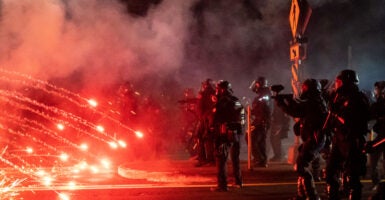Add up everything we know about the ongoing violence in America’s cities, and you get a troubling picture.
It has nothing to do with law-abiding, peaceful demonstrations in favor of civil rights and police reform. No, the violence that exploits these well-intentioned activities—which often occurs after night falls and demonstrations have ended—is part of an organized effort to implement a radical political agenda.
For starters, the violence is organized criminal activity. The same destructive activists have been identified at different times in different cities around the country. For example, in August, eight members of the Seattle-based group Riot Kitchen were arrested after wreaking havoc in Kenosha, Wisconsin.
Such groups are well-supported, as seen in the viral video of a rented U-Haul truck that appeared in Louisville, Kentucky, immediately after the grand jury verdict was announced in the Breonna Taylor case. The truck was stocked with riot gear and anti-police banners.
They are well-funded. In Grand Rapids, Michigan, for instance, the Michigan Solidarity Bail Fund posted $120,000 bail for rioters. Nationwide, bail funds have received tens of millions of dollars in donations in recent months.
These organized groups have no interest in demonstrating peacefully. They are showing up intending to commit violence. In Portland, Oregon, rioters came to the Portland courthouse armed with fireworks, Molotov cocktails, a circular saw, crowbars, rocks, frozen water bottles, and spikes—all instruments for conducting offensive actions.
National networks—most notably, Black Lives Matter—link these activities together. Check out the publicly available research on U.S. Crisis Monitor. Its report is actually sympathetic to the protests and is highly critical of U.S. law enforcement. Nevertheless, the data reveal some very disturbing trends.
Black Lives Matter is linked to the vast number of protests throughout the country. That, in itself, is not problematic. Many people and groups went to the streets to march in favor of civil liberties after the death of George Floyd. Yet, as the number of protests declined over the next three months, BLM participation did not, and the number of violent riots (as opposed to nonviolent protests) increased.
Over a three-month period, the report linked Black Lives Matter to 9 out of 10 riots. And there’s a good chance that that’s an undercount.
There’s an ideology behind the Black Lives Matter movement, and it has nothing to do with civil liberties. Indeed, as the organization has received more attention, and its link to an organization that has celebrated the Chinese Revolution and continues to defend China become known, Black Lives Matter attempted to purge Marxist statements that had previously been publicized on its websites.
We are also seeing organized groups conducting aggressive activity on social media to coordinate, promote, and propagandize violent activities.
According to a recent study by the Miller Center at Rutgers University, “We find evidence that both militia and anarchist networks play key roles in the recent social justice protests from controlling perimeters at CHAZ [CHOP] to coordinating nationwide anarchist-inspired violent protests online.”
When it comes to organized street violence, the response of public officials is key. That’s why the violence has mainly been focused on cities where state and local officials have created permissive environments, where it is easier for organized criminal activity to operate.
Portland, Oregon, and Seattle are prime examples. Officials have hamstrung the police and resisted cooperation with federal law enforcement.
And local “rogue” prosecutors have abetted violence by refusing to prosecute rioters and not enforcing law. For years, so-called progressive groups, including those funded by the philanthropist George Soros, have supported political campaigns to secure the election of liberal prosecutors.
In turn, those prosecutors in places like Portland and Seattle have in many cases been refusing to prosecute charges like disorderly conduct.
In Chicago, for example, police arrested more than 100 people after a night of rampant rioting and looting. The prosecutor did not pursue felony charges against anyone.
Finally, far too many journalists and politicians have normalized the acts of violence on our streets. They do this first by ignoring them—typified by the CNN reporter standing in front of a burning building and arguing that protests were “mostly peaceful.” Then they try to shift the blame on the police or the National Guard or Homeland Security or the administration.
And then they try to distance themselves from the issue altogether. As the public has turned decisively against the violence, they have done nothing but make excuses.
Perhaps all these dots are not consciously connected, but in concert they have reinforced and enabled one another. They explain why endemic, inexcusable destruction persists on the streets, and they reveal a serious effort to use violence to advance radical political change in this country.
This article first appeared in The Washington Times.




























